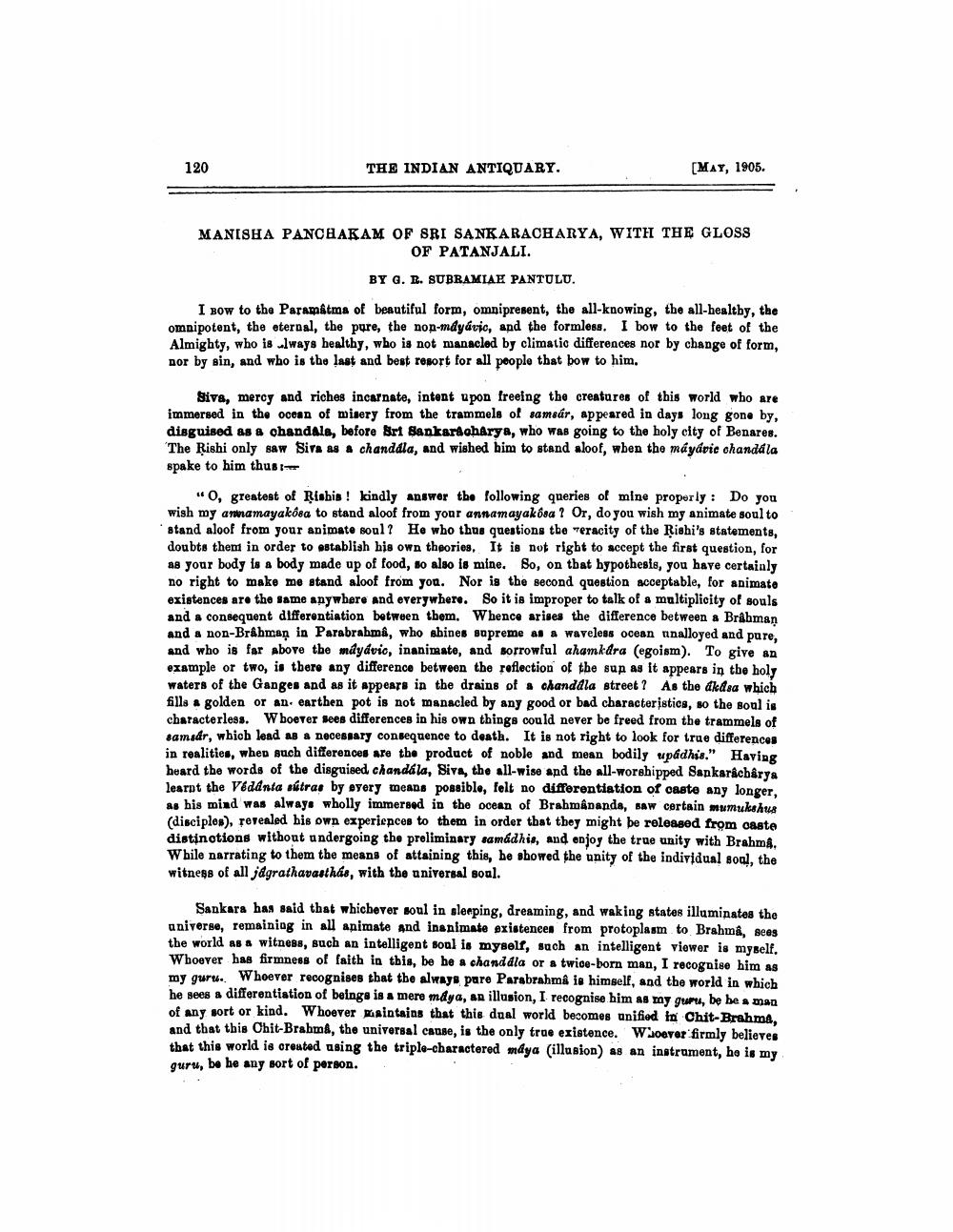________________
120
THE INDIAN ANTIQUARY.
[MAY, 1905.
MANISHA PANCHAKAM OF SRI SANKARACHARYA, WITH THE GLOSS
OF PATANJALI.
BY G. R. SUBRAMIAE PANTULU.
I Bow to the Paramitma of beautiful form, omnipresent, the all-knowing, the all-healthy, the omnipotent, the eternal, the pure, the non-mdyáric, and the formless. I bow to the feet of the Almighty, who is lways healthy, who is not manacled by climatic differences nor by change of form, nor by sin, and who is the last and best resort for all people that bow to him.
Siva, mercy and riches incarnate, intent upon freeing the creatures of this world who are immersed in the ocean of minery from the trammels of samsár, appeared in days long gone by, disguised as a chandale, before Brf Sankaracharya, who was going to the holy city of Benares. The Rishi only saw Sirs as a chanddla, and wished him to stand aloof, wben the máydric ohandála spake to him thus
"O, greatest of Riabis ! kindly answer the following queries of mine properly : Do you wish my annamayakosa to stand aloof from your annamayakosa ? Or, do you wish my animate soulto stand aloof from your animate soul? He who thus questions the "eracity of the Rishi's statements, doubts them in order to establish his own theories. It is not right to accept the first question, for as your body is a body made up of food, so also is mine. So, on that hypothesis, you have certainly no right to make me stand aloof from you. Nor is the second question acceptable, for animato existences are the same anywhere and everywhere. So it is improper to talk of a multiplicity of souls and a consequent differentiation between them. Whence arises the difference between a Brahman and a non-Brahman in Parabrahmi, who shines sopreme as a waveless ocean unalloyed and pure, and who is far above the mdyávio, inanimate, and sorrowful ahamkdra (egoism). To give an example or two, is there any difference between the reflection of the sup as it appears in the holy waters of the Ganges and as it appears in the drains of a chanddla street? As the dkd sa which fills a golden or an earthen pot is not manacled by any good or bad characteristics, so the soul is characterless. W boerer wees differences in his own things could never be freed from the trammels of samsår, which lead as a necessary consequence to death. It is not right to look for true differences in realities, when auch differences are the product of noble and mean bodily updhis." Having heard the words of the disguised chandála, Siva, the all-wise and the all-worshipped Sankaracharya learnt the Vedanta sútras by every means possible, felt no differentiation of caste any longer, as his mind was always wholly immersed in the ocean of Brahmananda, saw certain mumukshus (disciples), revealed his own experiences to them in order that they might be released from caste distinctions without undergoing the preliminary samadhis, and enjoy the true unity with Brahma. While narrating to them the means of attaining this, he showed the unity of the individual soul, the witness of all jagrathavasthás, with the universal soal.
Sankara has said that whichever soul in sleeping, dreaming, and waking states illuminates the aniverse, remaining in all animate and inanimate existeneen from protoplasm to Brahma, sees the world as a witness, such an intelligent soul is myself, such an intelligent viewer is myself. Whoever has firmness of faith in this, be be a chanddla or a twice-born man, I recognise him as my guru. Whoever recognises that the always pare Parabrahma is himself, and the world in which he sees a differentiation of beings is a mere mdya, an illusion, I recognise him as my gumus, be be a man of any sort or kind. Whoever misintains that this dual world becomes unified in Chit-Brahma, and that this Chit-Brahma, the universal cause, is the only true existence. Whoever firmly believes that this world is created using the triple-charactered mdya (illusion) as an instrument, he is my guru, be he any sort of person.




